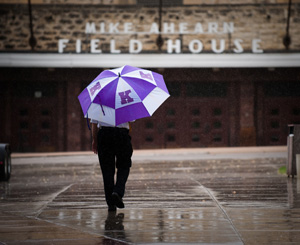KEEPING K-STATE SAFE
New team developed for quick, effective response to student crises
Ever since the shootings at Virginia Tech in 2007 and Northern Illinois University in 2008, officials at colleges across the nation have wondered "What would we do if that happened here?"
K-State officials have enacted a number of measures to address that very question.
The "Student of Concern" Web page may be found at:http://www.k-state.edu/studentlife/crisisassistance/studentconcern.htm |
The latest has been the creation of the Critical Incident Response Team, a group of campus officials who are called together when a significant campus situation involving students happens, or is brewing.
Also known as the CIRT, the group addresses incidents such as: student death or significant trauma; serious student situations involving medical or psychological issues; and campus threats or emergencies that can have a direct impact on student well being and the campus community.
"The CIRT is an organized way to respond to emergent student situations," said Heather Reed, director of K-State's office of student life. "It formalizes how we respond, how we gather information and what resources we utilize."
Reed chairs the team, which also includes representatives from dean's offices, campus police, counseling services and the office of general counsel. Representatives from other units are asked to serve when needed. This team approach was piloted successfully in the spring and was formally launched this fall.
Reed said that one of the challenges at K-State and on other college campuses has been gathering and sharing information in a timely fashion. For instance, one of the criticisms in the wake of the Virginia Tech shooting was that several different offices on campus had documented concerns about the shooter, but that information wasn't shared.
 The CIRT is designed to remedy that problem.
The CIRT is designed to remedy that problem.
"When we have the ability to gather information from multiple sources across campus, we get a better picture of what is going on with that student," she said. "This will create a centralized way to gather information and to let people know that there may be some issues with this student."
The group has also launched the "Student of Concern" Web page where anyone on campus can electronically report that a particular student may be having problems. That page may be found at: http://www.k-state.edu/studentlife/crisisassistance/studentconcern.htm
"We're working to develop a 'community of care' where when we have concerns about students, we're reporting and letting people know so they can be connected to resources," Reed said. "The earlier we can intervene the more likely we are going to be able to help get them back on track and be successful at K-State, which is our number one goal."
Reed said that though critical incidents are few and far between, they can affect the entire campus community. That's why having a proactive way to diffuse them is key to student success and keeping campus safe.
"These critical incidents can absolutely spiral out of control and impact the entire campus community if they aren't dealt with," she said. "We want to be able to intervene and get the student the help that they need and the earlier we know about a problem, the more we can do to ensure students become successful and remain at K-State."
Aside from convening when a potential crisis occurs, the CIRT also meets weekly to monitor potential issues and the campus climate.
For more information about the CIRT, go to: http://www.k-state.edu/studentlife/CIRT/index.htm